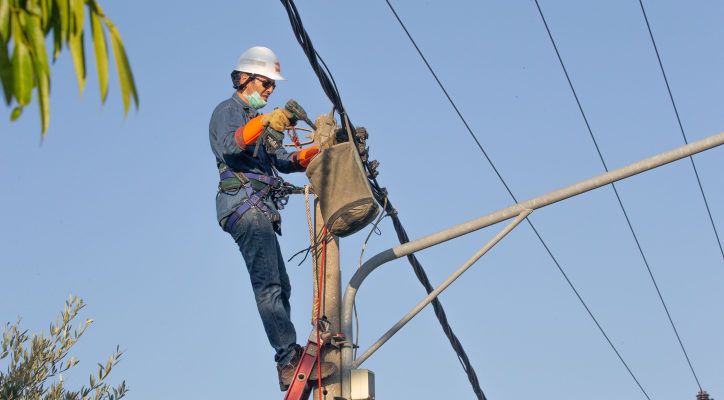Israel Electric Company workers’ union says they won’t repair damaged supply to Gaza until Hamas releases Israeli hostages and the bodies of two IDF soldiers.
By Paul Shindman, World Israel News
Israel Electric Company (IEC) employees announced Thursday they would not repair power lines supplying Gaza that were damaged in fighting with Hamas until the terror group releases two Israeli civilian hostages and returns the bodies of two IDF soldiers.
Five of the 10 high-voltage power lines that supply electricity to Gaza were damaged by the rocket fire from the Gaza Strip, and the workers union at the national power company said they do not intend to repair them “until the missing are returned.”
Hamas has been holding hostage two Israeli civilians, Avera Mengistu and Hisham al-Sayed, and the bodies of IDF soldiers Oron Shaul and Hadar Goldin.
Shaul and Goldin were killed in action during the 2014 Gaza war and their bodies are being held hostage by Hamas, which wants to exchange them for convicted terrorists being held in Israeli jails. Both of the civilians have mental health issues and walked on their own across the Gaza border in 2014 and 2015.
IEC workers committee chairman Miko Tsarfati said, “We do not step into the shoes of the leaders of the State of Israel, but we identify with the families.”
The four families have pressured the government for years to do something to release the hostages, but Hamas has insisted on exchanging them for large numbers of convicted terrorists.
Oron Shaul’s brother, Biram, told Ynet that Israel should not end retaliatory strikes on Hamas unless the group returns the hostages and the bodies of the missing soldiers.
“The desire to bring them back and the commitment [by authorities] tends to be zero,” Shaul said. “Senior members of the defense establishment as well as the political establishment say that the State of Israel will do everything in its power to return Oron and Hadar and the other prisoners who are in the Gaza Strip.”
“I hear quite a few people in panels on the news saying that the issue of prisoners and missing persons should not be involved at the end of this operation and I ask myself, so when?” Shaul asked.
In the most famous prisoner exchange with Hamas in 2011, Israel released more than 1,000 Palestinian prisoners, including hundreds serving life sentences for attacks on Israelis, in order to gain freedom for IDF soldier Gilad Shalit, who had been held hostage after being captured by Hamas in a 2006 tunnel attack that left two other IDF soldiers dead.
Although rocket fire from Gaza at Israeli population centers resumed Thursday morning, a halt to the hostilities is expected by Friday.
While diplomats and politicians are talking about a “ceasefire,” Hamas in the past has never agreed to use that word and instead uses the Arabic term meaning a “lull” – allowing the terror group to show its supporters that it did not give in to a “ceasefire” and reserves the right to attack at any time.




